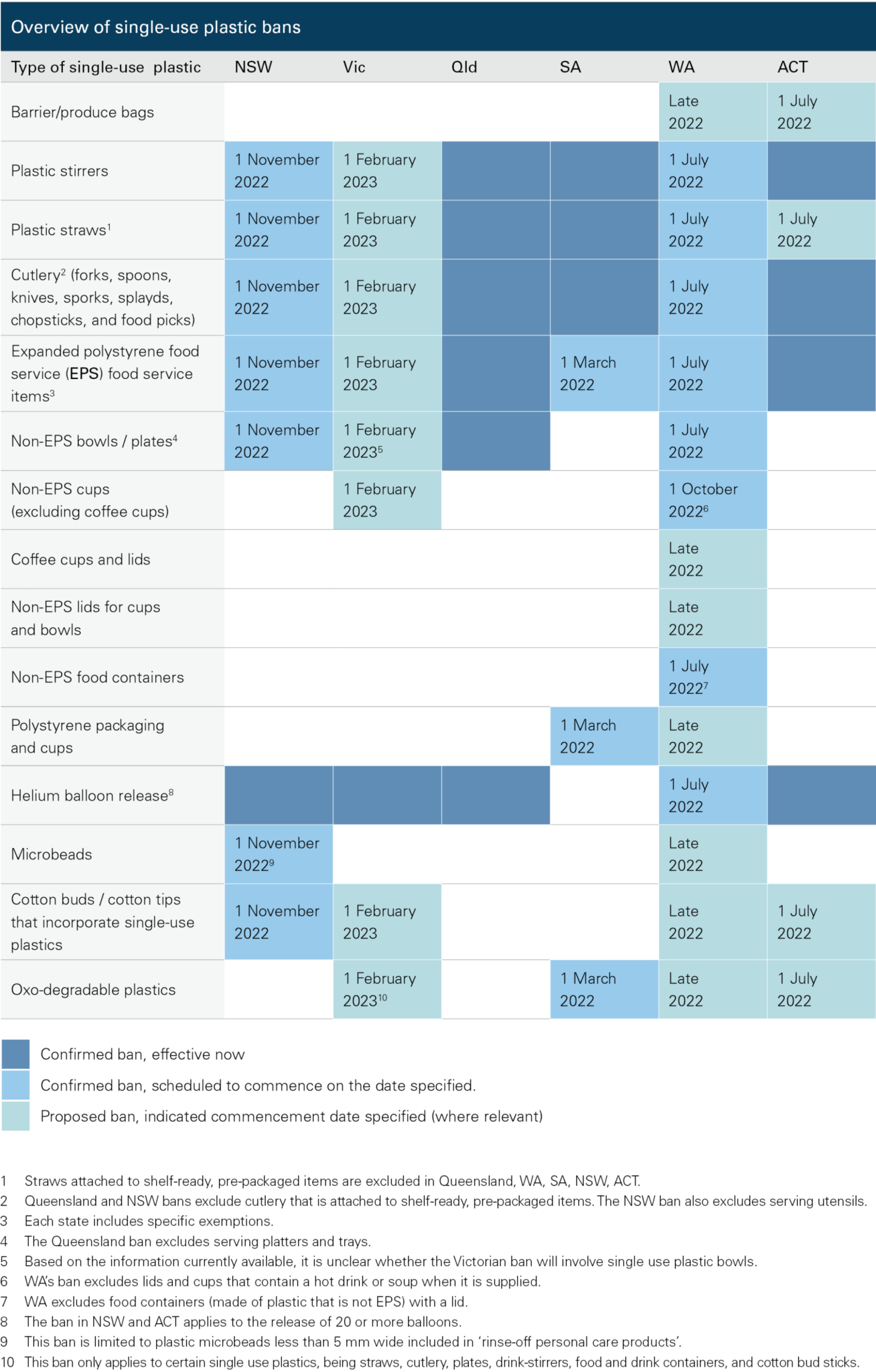Single-use plastic bans in Australia: where are we and what lies ahead?
22 February 2022
The NSW Parliament’s recent passing of the Plastic Reduction and Circular Economy Act 2021 (NSW), makes the State the last Australian jurisdiction to implement a ban against single-use plastic bags. This ban will come into effect on 1 June 2022.
In November 2021, Corrs discussed the NSW bill proposing to ban ‘unnecessary’ and ‘problematic’ plastic items, the precursor to the new Act.
As each state and territory are taking a different approach to the phasing out of single-use plastics and replacement with emerging alternatives, it is timely to reflect on progress across Australia.
The table below summarises the existing and proposed bans in each jurisdiction. By early 2023, the majority of single-use plastics listed below will be banned across Australia. Tasmania and Northern Territory are excluded from the table as their single-use plastics bans are limited to plastic bags.

There are various points to consider that arise from these bans.
Extraterritorial impacts
NSW and WA are the only jurisdictions that contemplate how the bans operate where the supply does not occur wholly within one state. In WA, the plastic ban only applies if both the supplier and the person supplied with the product are in the same state. In contrast, the NSW plastic ban applies outside of the state if it:
- affects, or is likely to affect, the environment of the state, or
- relates to the supply, or the likely supply, into or within the state of a regulated item, or
- relates to something that is likely to be an offence under the Plastic Reduction and Circular Economy Act 2021 (NSW) or the regulations.
The extraterritorial impacts are significant for businesses that operate or supply plastics in more than one jurisdiction. It will be interesting to observe how NSW seeks to enforce the extraterritorial application of the plastic ban and to monitor how other jurisdictions address this issue.
Inconsistent approach
Different strategies are imposed by different levels of government, industry and individual businesses. For example, in Tasmania and Northern Territory, state/territory-wide bans are limited to single-use plastic bags. However, local governments have imposed or proposed broader bans up by introducing by-laws in local government areas. For example, in the Hobart municipal area, retailers are banned from providing consumers with certain single-use food packaging and the City of Darwin has banned the use of single-use plastics from events held on Council land.
Multiple layers of regulation and municipal inconsistencies are likely to give rise to confusion and inadvertent non-compliances, at least in the short term. It will also make it difficult for manufacturers, distributors and end users of these products to understand and manage the application of the rule where such products are presently made available in multiple locations.
Exclusions to the ban on single-use plastic bags
The bans on single-use plastic bags throughout Australia generally apply to lightweight bags 35 microns or less in thickness. However, there are various exceptions to these bans, including ‘barrier bags’ (such as bin liners and bags for unpackaged perishable foods), bags to contain medical items, bags that are integral to the packaging in which goods are sealed prior to sale and biodegradable bags. The particular exceptions differ in each jurisdiction. Again, a uniform approach would be beneficial for consistency and for businesses that operate throughout Australia.
‘Compostable’ single-use plastics
Compostable plastics are addressed differently throughout Australia. Single-use plastic bags that are compostable in accordance with the Australian Industrial Composting Standard (AS 4736-2006) are permitted in Tasmania, SA, the ACT and the NT. Plastic bans in Queensland, WA and Tasmania (Hobart) also have carve outs for single-use plastic items that are ‘compostable’.
There is some tension between these exceptions and the waste hierarchy endorsed by the Australian Packaging Covenant Organisation. The hierarchy emphasises that recycling/composting opportunities should be considered only where avoidance, reduction or reuse is not possible.
To the extent that these exceptions continue to allow single-use ‘compostable’ plastics, they do not encourage consumer behaviour to reduce the use of single-use plastics.
Addressing greenwashing of plastics
‘Green’ claims about plastics are becoming more common, as are concerns that such claims are misused by manufacturers and retailers or misunderstood by consumers.
For example, describing a product as ‘biodegradable’ suggests that the product has honourable green credentials. However, ‘biodegradability’ in relation to plastics generally refers to the ability of a particular product or compound to degrade, naturally, into carbon dioxide, water and bio-mass over time typically with the help of micro-organisms.
Unlike industrial[1] and home[2] composting, there is no Australian Standard on biodegradable products. Improved understanding, such as through clear and consistent standards for biodegradable plastics, are important to reinforce the legitimacy of ‘biodegradability’ or ‘compostability’ claims associated with plastic products and, if mandated, can provide opportunities for differentiation of certified compostable or biodegradable products.
Oxo-degradable plastics
Oxo-degradable plastics are conventional polymers that have additives to accelerate the fragmentation of the plastic in sunlight or in the presence of oxygen or an anaerobic environment. These plastics fragment rapidly but are not necessarily biodegradable, which can lead to micro-plastics that cause harm to the environment.[3]
South Australia is the only jurisdiction that has a legislated ban of the manufacture, production, supply and distribution of oxo-degradable plastic products (which will come into effect in March 2022). Government reports indicate that bans on oxo-degradable plastics in more Australian jurisdictions may occur.
Looking ahead
Over the past 12 months, the state and territory wide bans have expanded from single-use plastic bags to include different types of single-use plastics. The types of single-use plastics bags that are banned has also expanded, as evident in WA and ACT, where bans on barrier/produce bags are proposed. Despite these developments, the above table shows there are various inconsistencies and gaps across Australia.
All of the above demonstrates that producers and consumers of all types of single-use plastics will need to keep abreast of changes in relation to the law and policy regulating these products.
Transitioning early to alternative products or arrangements and considering all options to reduce the use of single-use and non-compostable and non-biodegradable plastics will be important to retaining and enhancing the sustainability credentials of a business. While options to ‘green’ a business’ credentials around single-use plastics can present a great business opportunity, eventually, as we work towards a more sustainable future, this will also likely become essential to ensuring legal compliance and, accordingly, may become an issue of fundamental importance to business survival.
[1] Australian Standard AS4736:2006 - Biodegradable plastics: Biodegradable plastics suitable for composting and other microbial treatment
[2] Australian Standard AS 5810: 2010 Biodegradable plastics suitable for home composting
[3] Imogen Napper & Richard Thompson, ‘Environmental Deterioration of Biodegradable, Oxo-biodegradable, Compostable, and Conventional Plastic Carrier Bags in the Sea, Soil, and Open-Air Over a 3‑Year Period’ (2019) 53 Environmental Science & Technology 4775.
Authors

Head of Environment and Planning

Partner
Associate
Law Graduate
Tags
This publication is introductory in nature. Its content is current at the date of publication. It does not constitute legal advice and should not be relied upon as such. You should always obtain legal advice based on your specific circumstances before taking any action relating to matters covered by this publication. Some information may have been obtained from external sources, and we cannot guarantee the accuracy or currency of any such information.
Key Contact
Head of Environment and Planning

